外研版英语七年级上Module 4 Healthy foodUnit 3 Language in use.课件(34张PPT无素材)
文档属性
| 名称 | 外研版英语七年级上Module 4 Healthy foodUnit 3 Language in use.课件(34张PPT无素材) | 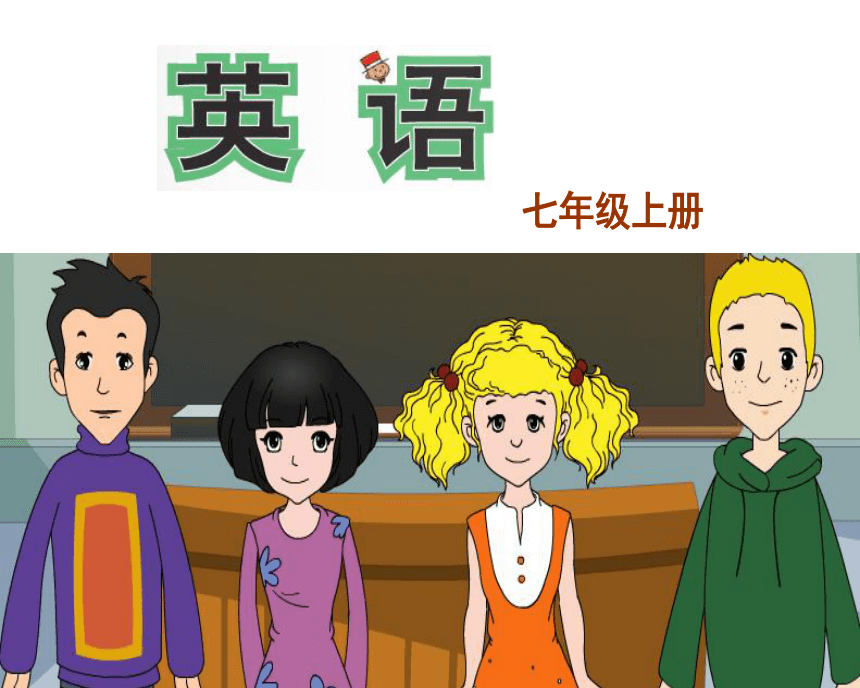 | |
| 格式 | zip | ||
| 文件大小 | 3.0MB | ||
| 资源类型 | 教案 | ||
| 版本资源 | 外研版 | ||
| 科目 | 英语 | ||
| 更新时间 | 2020-06-16 00:34:51 | ||
图片预览

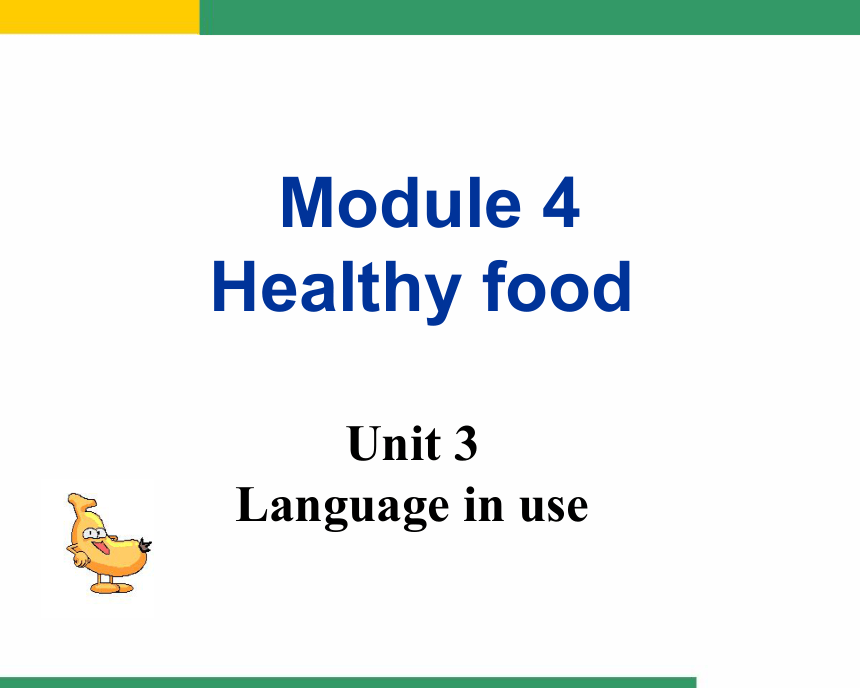
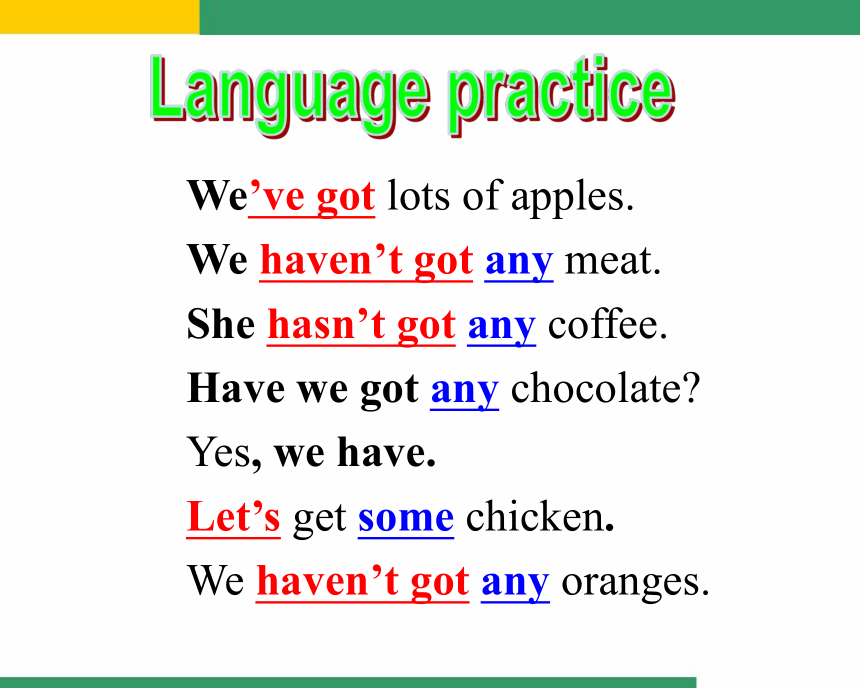
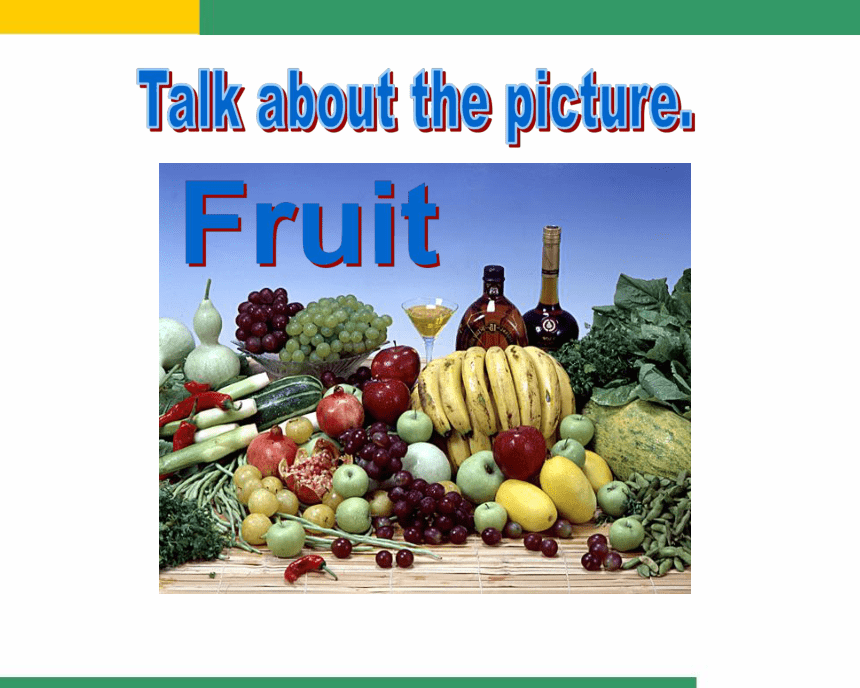
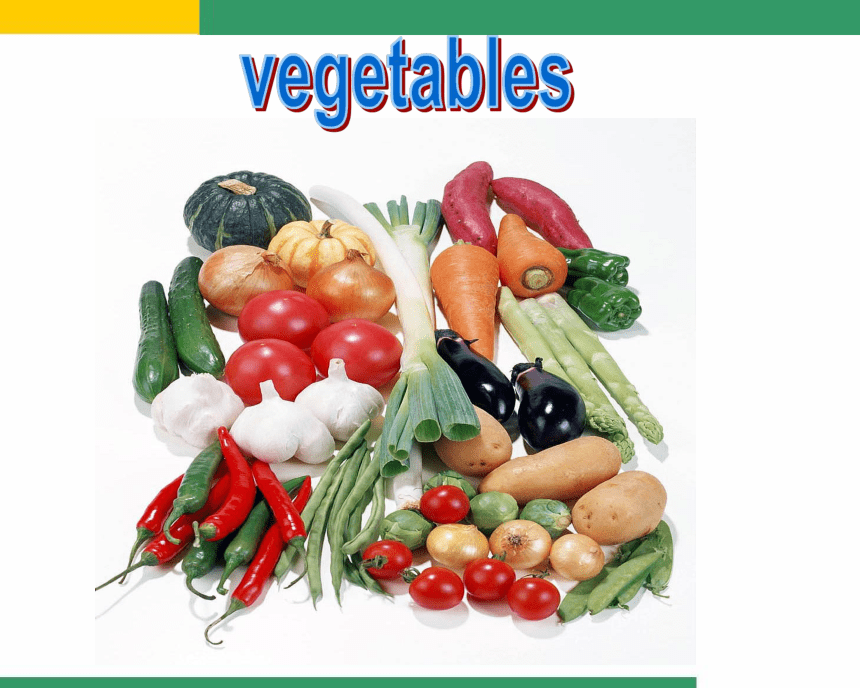
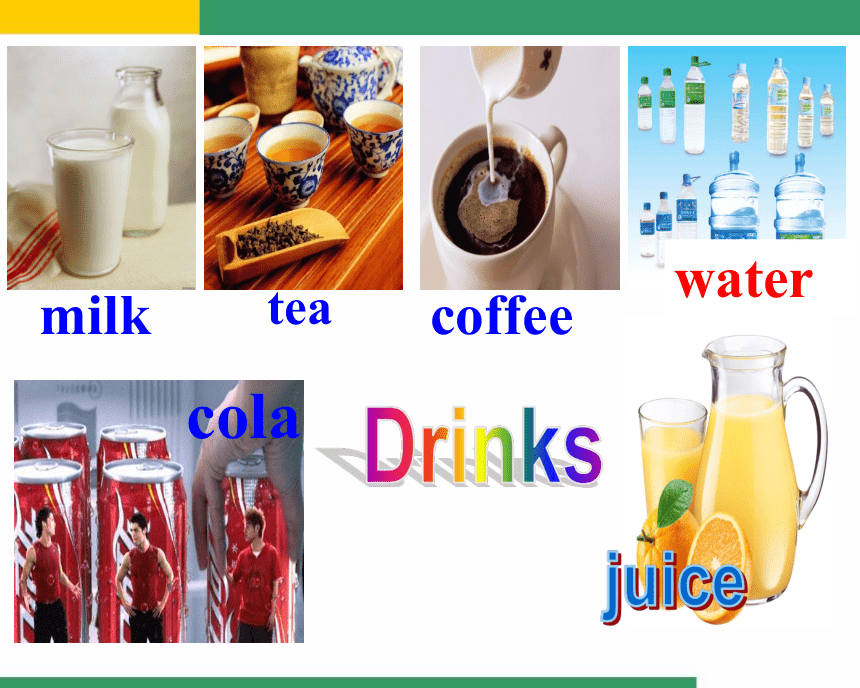
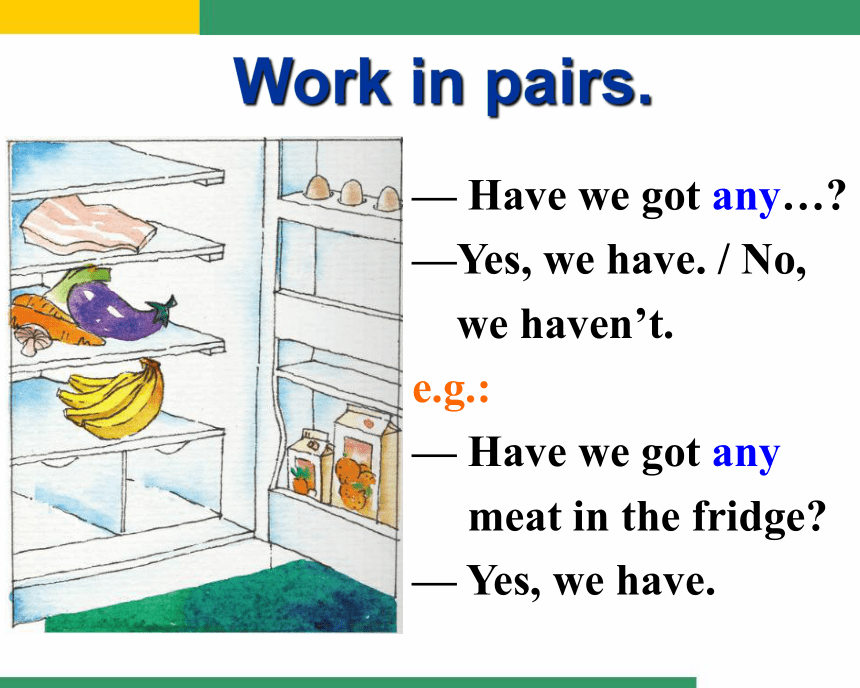
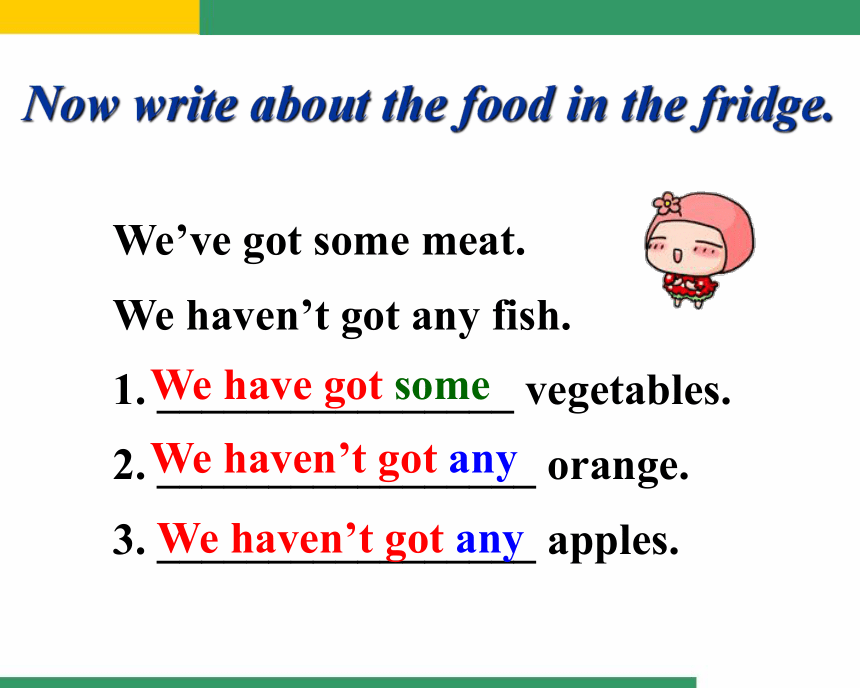
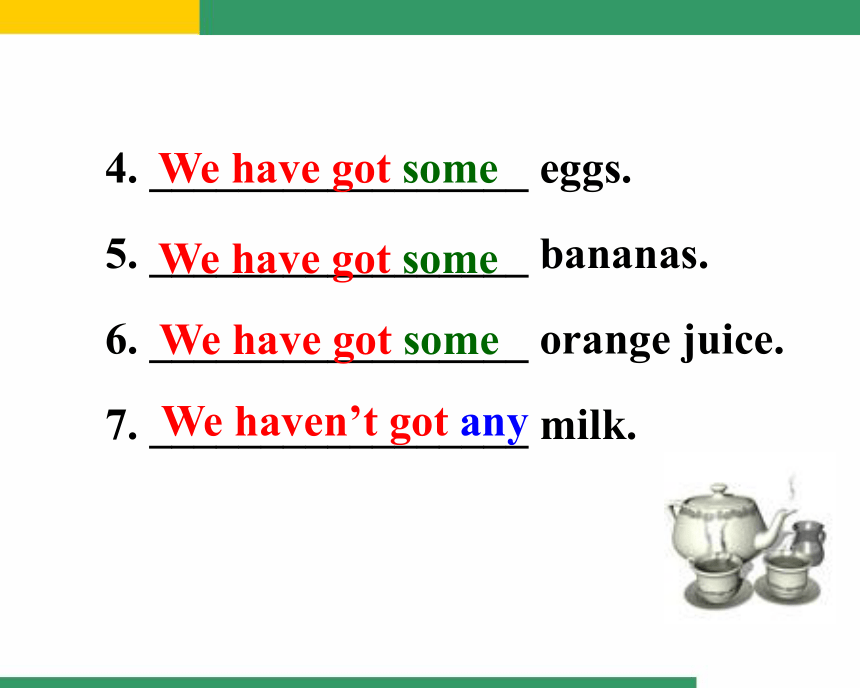
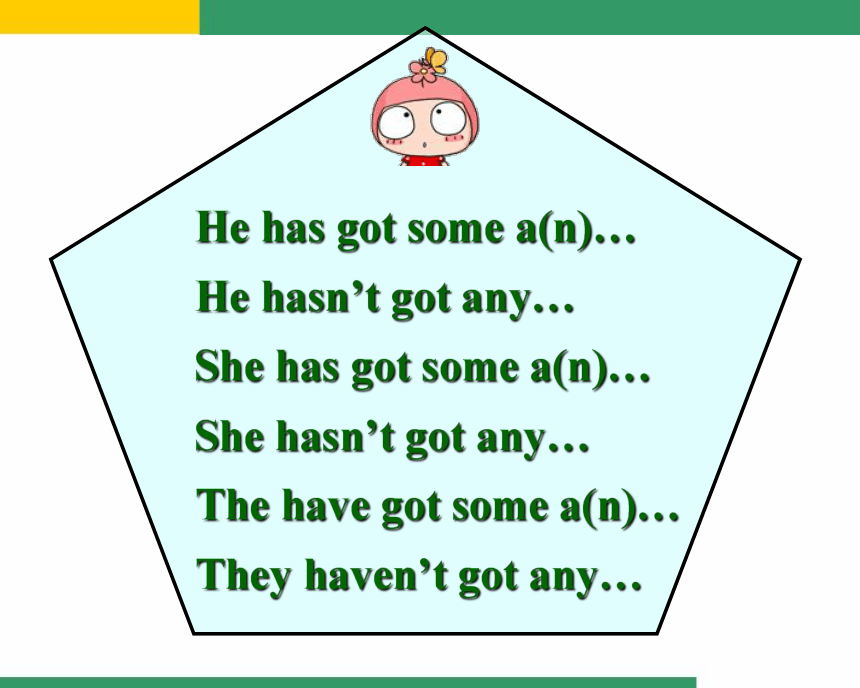
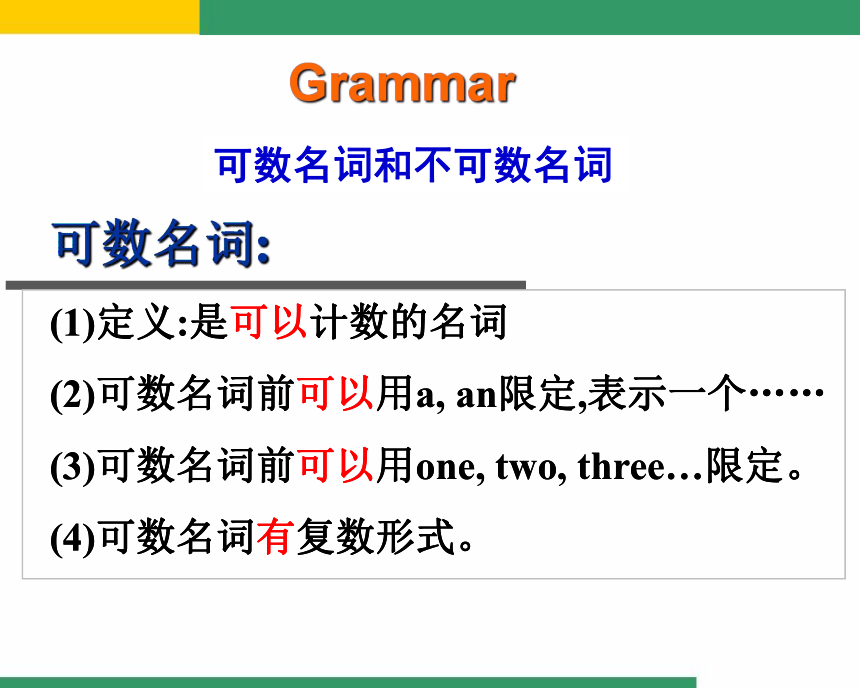

文档简介
(共34张PPT)
Module
4
Healthy
food
Unit
3
Language
in
use
We’ve
got
lots
of
apples.
We
haven’t
got
any
meat.
She
hasn’t
got
any
coffee.
Have
we
got
any
chocolate?
Yes,
we
have.
Let’s
get
some
chicken.
We
haven’t
got
any
oranges.
milk
tea
coffee
water
cola
—
Have
we
got
any…?
—Yes,
we
have.
/
No,
we
haven’t.
e.g.:
—
Have
we
got
any
meat
in
the
fridge?
—
Yes,
we
have.
Work
in
pairs.
We’ve
got
some
meat.
We
haven’t
got
any
fish.
1.
________________
vegetables.
2.
_________________
orange.
3.
_________________
apples.
Now
write
about
the
food
in
the
fridge.
We
have
got
some
We
haven’t
got
any
We
haven’t
got
any
4.
_________________
eggs.
5.
_________________
bananas.
6.
_________________
orange
juice.
7.
_________________
milk.
We
haven’t
got
any
We
have
got
some
We
have
got
some
We
have
got
some
He
has
got
some
a(n)…
He
hasn’t
got
any…
She
has
got
some
a(n)…
She
hasn’t
got
any…
The
have
got
some
a(n)…
They
haven’t
got
any…
可数名词:
(1)定义:是可以计数的名词
(2)可数名词前可以用a,
an限定,表示一个……
(3)可数名词前可以用one,
two,
three…限定。
(4)可数名词有复数形式。
可数名词和不可数名词
Grammar
可数名词:
(1)定义:是可以计数的名词
(2)可数名词前可以用a,
an限定,表示一个……
(3)可数名词前可以用one,
two,
three…限定。
(4)可数名词有复数形式。
A)
构成方法及读音规则
1)
一般情况加
–s:map-maps??boy-boys?
?girl-girls?
?pen-pens?
?bag-bags??car-cars
清辅音后读
浊辅音和元音后读
2)
以s,
sh,
ch,
x等结尾加
–es,如:
bus-buses?
?watch-watches?
?box-boxes?
?brush-brushes
?
可数名词复数形式变化
3)
以辅音字母+y结尾,
变
y
为
i
再加
es,
如:baby---babies?
?
city-cities?
?
country-countries
但以y结尾的专有名词,或元音字母+y
结尾的名词变复数时,直接加s变复数。
如:
?
monkey---monkeys ?
?
holiday---holidays
4)
以o结尾的名词,变复数时:
A.
加s,
如:
photo—
photos
piano—pianos
radio—radios
zoo—zoos;
B.
加es,
如:
potato—
potatoes
tomato—tomatoes
5)
以
f
或
fe
结尾的名词变复数时:
改
f,
fe
v加
-es,
如:half—halves
knife—knives
leaf--leaves ?
??
wolf—wolves
wife—wives
life—lives ?
??
???
Notes:
由一个词加
man
或
woman构成的合成词,
其复数形式也是
-men
和-women,
如an
Englishman,
two
Englishmen。但German不是合成词,
故复数形式为Germans;Bowman是姓,其复数是the
Bowmans。
B)名词复数的不规则变化
child—children,
foot—feet,
tooth—teeth,
mouse—mice,?
?
man—-men,
woman—women
2)
单复同形,
如deer,
sheep,
fish,
Chinese,
Japanese,
等。但除人民币的元、角、分外,
美元、英镑、法郎等都有复数形式。如:a
dollar,
two
dollars;
a
meter,
two
meters。
3)
集体名词,
以单数形式出现,
但实为复数。例如:people,
police
等本身就是复数,不能说
a
people,
a
police,
但可以说a
person,
a
policeman.
4)以s结尾,仍为单数的名词,如:
a.
maths,
politics,
physics等学科名词,一般是不可数名词,为单数。
b.
news
为不可数名词。
c.
the
United
States,
the
United
Nations
应视为单数。
The
United
Nations
was
organized
in
1945.
联合国是1945年组建起来的。
d.
以复数形式出现的书名,剧名,报纸,杂志名,也可视为单数。
5)
表示由两部分构成的东西,如:glasses
(眼镜)trousers, clothes等,若表达具体数目,要借助数量词
pair(对,双); suit(套);
如:
a
pair
of
glasses,
一副眼镜;two
pairs
of
trousers,一条裤子等。
6)
另外还有一些名词,其复数形式有时可表示特别意思,如:goods
货物,waters
水域,fishes(各种)鱼。
不可数名词
(1)定义:是指不能计数的名词。
(2)不可数名词前不可以用a
,
an限定。
(3)不可数名词前不可以用one,
two,
three…
限定。
(4)不可数名词没有复数形式。
不可数名词主要分为
物质名词和抽象名词。
1)
物质名词是指表示无法分为个体的实物的词,
常见的物质名词,
如:snow(雪),
rain(雨),
water(水),
coffee(咖啡),
tea(茶),
meat
(肉),
milk(牛奶),
rice(米饭),
bread(面包),
orange
(桔汁),
beef
(牛肉),
chicken(鸡肉),
juice
(果汁),
pork(猪肉),
Coke
(可口可乐),
ice
cream
(冰激凌)
等;
2)
抽象名词是指表示动作、状态、品质、感情等抽象概念的词,常见的抽象名词,如:work(工作),
study(学习),
love(爱),
friendship
(友谊)等。
A.写出下列名词的复数形式
1.
apple
–
apples
2.
orange
–
oranges
3.
potato
–
potatoes
4.
carrot
–
carrots
5.
banana
–
bananas
6.
egg
–
eggs
7.
hamburger
–
hamburgers
8.
noodle
–
noodles
9.
onion
–
onions
10.
vegetable
–
vegetables
11.
tomato
–
tomatoes
12.
melon
–
melons
carrots
tomatoes
vegetables
bananas
apples
oranges
fruit
healthy
food
ice
cream
beef
favourite
food
food
juice
water
milk
healthy
drink
favourite
drink
milk
beef
chicken
fish
meat
potatoes
Complete
the
word
map.
drink
tea
1.
_________
to
buy
some
fruit.
2.
It’s
_________
to
eat
healthy
food.
3.
Eat
well
and
____
healthy.
4.
Orange
juice
is
________.
Let’s
buy
some.
5.
I
am
a
___
tired.
bit
delicious
important
remember
stay
Remember
important
stay
delicious
bit
Complete
the
sentences
with
the
words
from
the
box.
In
the
West,
for
breakfast,
people
usually
eat
bread
and
eggs
and
drink
coffee
or
tea,
milk
and
fruit
juice.
Module
task:
Making
a
poster
about
a
healthy
breakfast
Work
in
groups
of
four
or
five.
Make
a
poster
about
a
healthy
breakfast.
Make
a
list
of
questions
about
a
healthy
breakfast.
Talk
to
students
from
another
group
about
a
healthy
breakfast.
Make
a
poster
about
your
healthy
breakfast.
Exercises
A.
用
some,
any填空。
1.
Have
you
got
____
fruit?
Yes,
we
have.
2.
Have
we
got
___
meat?
No,
we
haven’t.
3.
We’ve
got
_____
oranges
and
____
apples.
4.
We
have
got
_____
melons.
5.
We
haven’t
got
____
tomatoes.
any
any
any
some
some
some
B.
完成句子:
1.
我们有一些猪肉吗?
没有。
______
we
_____________?
No,
__________.
2.
你们有一些土豆吗?
有。
_____
you____________?
Yes,
_______.
3.
我们的冰箱里没有胡萝卜。
We
____________________
in
the
fridge.
Have
got
any
pork
we
have
Have
got
any
pork
we
haven’t
haven’t
got
any
carrots
4.
鱼和蔬菜是健康的食品,但汉堡包不是。
Fish
and
vegetables
________________,
______________________
healthy
food.
5.
吃些水果,不要吃糖果和冰激淋。
___
some
fruit,
___
candies
__
ice
cream.
are
healthy
food
but
hamburgers
aren’t
Eat
not
or
C.根据首字母提示,在空格处填入正确的词,
使短文意思完整。
My
name
is
Tom.
I’m
from
A
_________
I’m
fourteen
y
____
old.
I’m
in
China
with
my
p
_______
now.
I
like
China.
I
like
C
_____
food,
too.
I
eat
rice
and
v
_________
everyday.
They
are
h
______
food.
merica
ears
arents
hinese
egetables
ealthy
My
favourite
vegetables
are
carrots
and
t________.
I
like
drinking
tea.
My
father
and
mother
also
like
d
_______
tea,
too.
I
don’t
like
Coke.
Coke
is
u
_______
drink.
I
also
eat
noodles,
fish
and
meat.
I
don’t
like
candy.
Candy
isn’t
healthy
food.
I
like
fruit.
Apples
are
my
favourite
f
___.
omatoes
rinking
nhealthy
ruit
Homework
Write
a
passage
about
your
favourite
food,
including
drink,
vegetables,
fruit,
and
so
on.
Good
bye!
Module
4
Healthy
food
Unit
3
Language
in
use
We’ve
got
lots
of
apples.
We
haven’t
got
any
meat.
She
hasn’t
got
any
coffee.
Have
we
got
any
chocolate?
Yes,
we
have.
Let’s
get
some
chicken.
We
haven’t
got
any
oranges.
milk
tea
coffee
water
cola
—
Have
we
got
any…?
—Yes,
we
have.
/
No,
we
haven’t.
e.g.:
—
Have
we
got
any
meat
in
the
fridge?
—
Yes,
we
have.
Work
in
pairs.
We’ve
got
some
meat.
We
haven’t
got
any
fish.
1.
________________
vegetables.
2.
_________________
orange.
3.
_________________
apples.
Now
write
about
the
food
in
the
fridge.
We
have
got
some
We
haven’t
got
any
We
haven’t
got
any
4.
_________________
eggs.
5.
_________________
bananas.
6.
_________________
orange
juice.
7.
_________________
milk.
We
haven’t
got
any
We
have
got
some
We
have
got
some
We
have
got
some
He
has
got
some
a(n)…
He
hasn’t
got
any…
She
has
got
some
a(n)…
She
hasn’t
got
any…
The
have
got
some
a(n)…
They
haven’t
got
any…
可数名词:
(1)定义:是可以计数的名词
(2)可数名词前可以用a,
an限定,表示一个……
(3)可数名词前可以用one,
two,
three…限定。
(4)可数名词有复数形式。
可数名词和不可数名词
Grammar
可数名词:
(1)定义:是可以计数的名词
(2)可数名词前可以用a,
an限定,表示一个……
(3)可数名词前可以用one,
two,
three…限定。
(4)可数名词有复数形式。
A)
构成方法及读音规则
1)
一般情况加
–s:map-maps??boy-boys?
?girl-girls?
?pen-pens?
?bag-bags??car-cars
清辅音后读
浊辅音和元音后读
2)
以s,
sh,
ch,
x等结尾加
–es,如:
bus-buses?
?watch-watches?
?box-boxes?
?brush-brushes
?
可数名词复数形式变化
3)
以辅音字母+y结尾,
变
y
为
i
再加
es,
如:baby---babies?
?
city-cities?
?
country-countries
但以y结尾的专有名词,或元音字母+y
结尾的名词变复数时,直接加s变复数。
如:
?
monkey---monkeys ?
?
holiday---holidays
4)
以o结尾的名词,变复数时:
A.
加s,
如:
photo—
photos
piano—pianos
radio—radios
zoo—zoos;
B.
加es,
如:
potato—
potatoes
tomato—tomatoes
5)
以
f
或
fe
结尾的名词变复数时:
改
f,
fe
v加
-es,
如:half—halves
knife—knives
leaf--leaves ?
??
wolf—wolves
wife—wives
life—lives ?
??
???
Notes:
由一个词加
man
或
woman构成的合成词,
其复数形式也是
-men
和-women,
如an
Englishman,
two
Englishmen。但German不是合成词,
故复数形式为Germans;Bowman是姓,其复数是the
Bowmans。
B)名词复数的不规则变化
child—children,
foot—feet,
tooth—teeth,
mouse—mice,?
?
man—-men,
woman—women
2)
单复同形,
如deer,
sheep,
fish,
Chinese,
Japanese,
等。但除人民币的元、角、分外,
美元、英镑、法郎等都有复数形式。如:a
dollar,
two
dollars;
a
meter,
two
meters。
3)
集体名词,
以单数形式出现,
但实为复数。例如:people,
police
等本身就是复数,不能说
a
people,
a
police,
但可以说a
person,
a
policeman.
4)以s结尾,仍为单数的名词,如:
a.
maths,
politics,
physics等学科名词,一般是不可数名词,为单数。
b.
news
为不可数名词。
c.
the
United
States,
the
United
Nations
应视为单数。
The
United
Nations
was
organized
in
1945.
联合国是1945年组建起来的。
d.
以复数形式出现的书名,剧名,报纸,杂志名,也可视为单数。
5)
表示由两部分构成的东西,如:glasses
(眼镜)trousers, clothes等,若表达具体数目,要借助数量词
pair(对,双); suit(套);
如:
a
pair
of
glasses,
一副眼镜;two
pairs
of
trousers,一条裤子等。
6)
另外还有一些名词,其复数形式有时可表示特别意思,如:goods
货物,waters
水域,fishes(各种)鱼。
不可数名词
(1)定义:是指不能计数的名词。
(2)不可数名词前不可以用a
,
an限定。
(3)不可数名词前不可以用one,
two,
three…
限定。
(4)不可数名词没有复数形式。
不可数名词主要分为
物质名词和抽象名词。
1)
物质名词是指表示无法分为个体的实物的词,
常见的物质名词,
如:snow(雪),
rain(雨),
water(水),
coffee(咖啡),
tea(茶),
meat
(肉),
milk(牛奶),
rice(米饭),
bread(面包),
orange
(桔汁),
beef
(牛肉),
chicken(鸡肉),
juice
(果汁),
pork(猪肉),
Coke
(可口可乐),
ice
cream
(冰激凌)
等;
2)
抽象名词是指表示动作、状态、品质、感情等抽象概念的词,常见的抽象名词,如:work(工作),
study(学习),
love(爱),
friendship
(友谊)等。
A.写出下列名词的复数形式
1.
apple
–
apples
2.
orange
–
oranges
3.
potato
–
potatoes
4.
carrot
–
carrots
5.
banana
–
bananas
6.
egg
–
eggs
7.
hamburger
–
hamburgers
8.
noodle
–
noodles
9.
onion
–
onions
10.
vegetable
–
vegetables
11.
tomato
–
tomatoes
12.
melon
–
melons
carrots
tomatoes
vegetables
bananas
apples
oranges
fruit
healthy
food
ice
cream
beef
favourite
food
food
juice
water
milk
healthy
drink
favourite
drink
milk
beef
chicken
fish
meat
potatoes
Complete
the
word
map.
drink
tea
1.
_________
to
buy
some
fruit.
2.
It’s
_________
to
eat
healthy
food.
3.
Eat
well
and
____
healthy.
4.
Orange
juice
is
________.
Let’s
buy
some.
5.
I
am
a
___
tired.
bit
delicious
important
remember
stay
Remember
important
stay
delicious
bit
Complete
the
sentences
with
the
words
from
the
box.
In
the
West,
for
breakfast,
people
usually
eat
bread
and
eggs
and
drink
coffee
or
tea,
milk
and
fruit
juice.
Module
task:
Making
a
poster
about
a
healthy
breakfast
Work
in
groups
of
four
or
five.
Make
a
poster
about
a
healthy
breakfast.
Make
a
list
of
questions
about
a
healthy
breakfast.
Talk
to
students
from
another
group
about
a
healthy
breakfast.
Make
a
poster
about
your
healthy
breakfast.
Exercises
A.
用
some,
any填空。
1.
Have
you
got
____
fruit?
Yes,
we
have.
2.
Have
we
got
___
meat?
No,
we
haven’t.
3.
We’ve
got
_____
oranges
and
____
apples.
4.
We
have
got
_____
melons.
5.
We
haven’t
got
____
tomatoes.
any
any
any
some
some
some
B.
完成句子:
1.
我们有一些猪肉吗?
没有。
______
we
_____________?
No,
__________.
2.
你们有一些土豆吗?
有。
_____
you____________?
Yes,
_______.
3.
我们的冰箱里没有胡萝卜。
We
____________________
in
the
fridge.
Have
got
any
pork
we
have
Have
got
any
pork
we
haven’t
haven’t
got
any
carrots
4.
鱼和蔬菜是健康的食品,但汉堡包不是。
Fish
and
vegetables
________________,
______________________
healthy
food.
5.
吃些水果,不要吃糖果和冰激淋。
___
some
fruit,
___
candies
__
ice
cream.
are
healthy
food
but
hamburgers
aren’t
Eat
not
or
C.根据首字母提示,在空格处填入正确的词,
使短文意思完整。
My
name
is
Tom.
I’m
from
A
_________
I’m
fourteen
y
____
old.
I’m
in
China
with
my
p
_______
now.
I
like
China.
I
like
C
_____
food,
too.
I
eat
rice
and
v
_________
everyday.
They
are
h
______
food.
merica
ears
arents
hinese
egetables
ealthy
My
favourite
vegetables
are
carrots
and
t________.
I
like
drinking
tea.
My
father
and
mother
also
like
d
_______
tea,
too.
I
don’t
like
Coke.
Coke
is
u
_______
drink.
I
also
eat
noodles,
fish
and
meat.
I
don’t
like
candy.
Candy
isn’t
healthy
food.
I
like
fruit.
Apples
are
my
favourite
f
___.
omatoes
rinking
nhealthy
ruit
Homework
Write
a
passage
about
your
favourite
food,
including
drink,
vegetables,
fruit,
and
so
on.
Good
bye!
同课章节目录
- Starte
- Module 1 My teacher and my friends
- Module 2 My English lesson
- Module 3 My English book
- Module 4 My everyday life
- Module 1 My classmates
- Unit 1 Nice to meet you.
- Unit 2 I'm Wang Lingling and I'm thirteen years ol
- Unit 3 Language in use.
- Module 2 My family
- Unit 1 Is this your mum?
- Unit 2 These are my parents.
- Unit 3 Language in use.
- Module 3 My school
- Unit 1 There are thirty students in my class.
- Unit 2 The library is on the left of the playgroun
- Unit 3 Language in use.
- Module 4 Healthy food
- Unit 1 We've got lots of apples.
- Unit 2 Is your food and drink healthy?
- Unit 3 Language in use.
- Module 5 My school day
- Unit 1 I love history.
- Unit 2 We start work at nine o'clock.
- Unit 3 Language in use.
- Revision module A
- Module 6 A trip to the zoo
- Unit 1 Does it eat meat?
- Unit 2 The tiger lives in Asia.
- Unit 3 Language in use.
- Module 7 Computers
- Unit 1 How do I write my homework on the computer?
- Unit 2 When do you use a computer?
- Unit 3 Language in use.
- Module 8 Choosing presents
- Unit 1 I always like birthday parties.
- Unit 2 She often goes to concerts.
- Unit 3 Language in use.
- Module 9 People and places
- Unit 1 We're enjoying the school trip a lot.
- Unit 2 They're waiting for buses or trains.
- Unit 3 Language in use.
- Module 10 Spring Festival
- Unit 1 Are you getting ready for Spring Festival?
- Unit 2 My mother's cleaning our houses and sweepin
- Unit 3 Language in use.
- Revision module B
